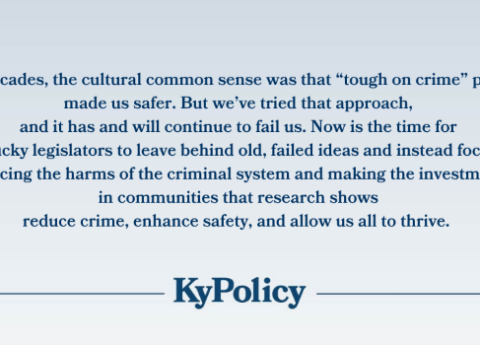Going into this legislative session, the Kentucky General Assembly was poised to make criminal justice reforms that would reduce the state’s growing inmate population and associated costs while also maintaining public safety. However, some of the criminal justice legislation moving through the legislature would take the state in a very different direction by increasing penalties for certain crimes. In addition to further expanding the state’s inmate population and adding strain to the state’s prisons and jails, these approaches do not include proven solutions to address drug addiction and violence.
SB 14, which has already passed the Senate, would lock up more addicts for long periods of time as it increases penalties for heroin and fentanyl trafficking under two grams; while proponents argue that the bill would only affect commercial traffickers, Kentucky’s definition of drug trafficking is so broad that one addict passing any amount of heroin or fentanyl to another would be considered trafficking and, under this bill, carry with it a 5 to 10 year prison sentence. SB 14 would cost between $30 and $35 million and is not backed by research as a proven way to address the drug addiction crisis that wracks our state. HB 333 is a similar bill, although because it only deals with increasing penalties for fentanyl trafficking under two grams the fiscal impact would be smaller, around $4 million.
HB 315, which just passed the House, attempts to address violent crime in the state by dramatically increasing criminal penalties for individuals who commit crimes in some way connected to a gang and makes it easier to prove gang affiliation; the bill also makes penalties for gang recruitment harsher than currently exist. This approach goes against what research says is effective, including the evidence from other states when similar laws were enacted. And it comes with a $38 million price tag.
Meanwhile, the bill coming out of the governor’s Criminal Justice Policy Assessment Council (CJPAC) — SB 120, which recently passed the Senate — would provide some good first steps in improving reentry that can pay off in the long run in decreasing recidivism. But the bill would do little to cut corrections costs in the immediate future. The “big ticket” policy changes under consideration by the CJPAC such as reforming the state’s mandatory minimums for repeat offenders or reclassifying some low-level felonies as misdemeanors did not end up in SB 120.
At the same time, the state is already anticipating having to spend $35 million over what was budgeted for corrections in 2017 due to the inmate population being higher than projected. That’s on top of $89.6 million over the past five years in extra money needed due to the state’s inmate population being above projections.
Before bills that add more costs to our corrections budget are signed into law, legislators should consider whether they are the best use of limited state resources. We need solutions to drug addiction that expand treatment and interventions that transform the lives of troubled youth who might otherwise go on to commit violent crimes. SB 120 would be a first step forward in helping with barriers to reentry, but the other bills mentioned above would move the state backward.
This column originally ran in the Courier-Journal on March 1, 2017. It ran on KyForward.com on March 6, 2017.



